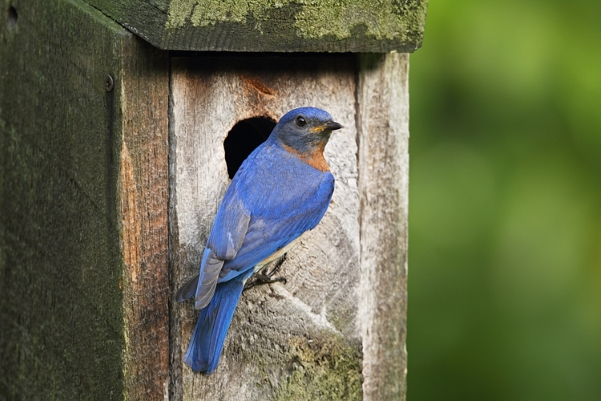Press Releases

02/22/2017
Providing Housing for Bluebirds One Box at a Time DEEP Bluebird Project Marks 37 Years
Connecticut’s Department of Energy and Environmental Protection (DEEP) today announced that bundled, uncut lumber for building bluebird nest boxes is available at no charge to organized groups, such as schools, scouts, conservation commissions, and garden clubs, on a first come, first serve basis. Interested groups can reserve one or two bundles by sending an email to DEEP Wildlife Division biologist Brian Hess at Brian.Hess@ct.gov. Please include the group name, group leader’s name, a mailing address, number of bundles requested (maximum of two per group), and preferred pickup location (Sessions Woods WMA, Franklin Swamp WMA, or Sherwood Island State Park). Each bundle yields approximately 15-20 nest boxes when cut up.
Organized groups that reserve bundled lumber should note:
- The lumber, which is harvested from state forests, comes as eight-foot, bundled rough-cut planks, and all groups will be responsible for cutting the wood to the proper dimensions. Hardware for construction of the boxes is not provided. Instructions for assembly and tips for nest box placement and maintenance are included.
- Recipients are responsible for picking up and loading their wood at either the Sessions Woods Wildlife Management Area, located at 341 Milford Street (Route 69) in Burlington; Franklin Swamp Wildlife Management area, located at 391 Franklin Turnpike (Route 32) in North Franklin; or Sherwood Island State Park in Westport.
- Participating groups are expected monitor their bluebird nest boxes throughout the entire nesting season (March-July) and then report box usage to the Wildlife Division.
The DEEP Wildlife Division’s Connecticut Bluebird Project has been distributing rough-cut lumber to groups to construct, install, and maintain bluebird nest boxes since the project’s inception in 1980. This annual program has been highly successful, generating tens of thousands of bluebird boxes and helping restore bluebird populations statewide.
A shortage of natural nesting cavities in suitable habitat and displacement from existing nest cavities by aggressive (and non-native) European starlings and English sparrows contributed to the decline of the bluebird population. Although competition is still an issue, man-made nest boxes have made a dramatic difference, and Connecticut’s bluebird population – once limited to a handful of locations – is now found statewide.
Individuals interested in installing a bluebird nest box on their property can buy or make a box. While fully constructed nest boxes are often available from home and garden centers or bird specialty stores, buy carefully because many pre-made boxes are not appropriate for bluebirds. To properly function as a bluebird nest box, it must be large enough (at least 4” x 4” at the base); provide a wide enough opening (1.5 inches in diameter); be accessible for routine nest checks; and be made of durable material that will protect young chicks from inclement weather. Building your own box means you can ensure it meets the needs of the bluebirds. The DEEP Wildlife Division’s Eastern Bluebird Fact Sheet contains directions for building two different styles of boxes. The fact sheet also contains information about the best places to install bluebird boxes and how to go about checking them. The fact sheet can be found at http://go.usa.gov/x9e57.
Properly locating the nest boxes and making periodic visits during the nesting season to remove unwanted occupants increases the prospects for the bluebird’s continued recovery in our state. Rather than a one-day craft project, building a nest box provides an opportunity to view these once-rare, attractive birds throughout the summer and to maintain their box for years of enjoyment to come.
Photo Attached: Credit Paul J. Fusco/DEEP Wildlife Division
Suggested Caption: Since 1980, the DEEP Wildlife Division’s “Connecticut Bluebird Project” has been distributing rough-cut lumber to organized groups to construct, install, and maintain bluebird nest boxes. This annual program has been highly successful in generating tens of thousands of bluebird boxes and helping restore bluebird populations statewide.
- Twitter: @CTDEEPNews
- Facebook: DEEP on Facebook


